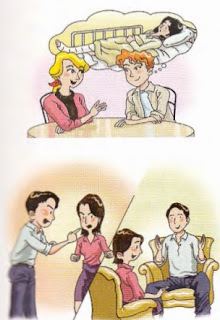가: 자야 씨가 입원했다면서요?
Is it true that Jaya is in the hospital?
나: 며칠 전에 교통사고가 나서 입원하게 되었어요.
She got in a traffic accident a few days ago and was hospitalized.
가: 요즘에 남편하고 사이가 좋아졌어요?
Have you gotten along better with your husband lately?
나: 네, 서로 이야기를 많이 한 후에 서로 잘 이해하게 되었어요.
Yes, we came to understand each other better after we talked about a lot of things.
This expression is used to express the passive in cases in which the subject’s will or intention is not involved.
 • 한국으로 유학을 와서 작년부터 서울에 살게 되었어요.
• 한국으로 유학을 와서 작년부터 서울에 살게 되었어요.
I came to Korea to study, and last year I came to live in Seoul.
• 친구가 이 가게를 좋아하니까 저도 자주 오게 돼요.
Because my friend likes this store, I have come to frequent it often, too.
• 다음 학기에 친구들이 모두 고향으로 돌아가고 저만 흔자 한국에 남게 될 것 같아요.
Next semester, all of my friends will go back home, and it looks like I alone will be left in Korea.
1. This expression is often used in the form -게 되었어요 to indicate a state or situation that has come to be true in the present, or that has been decided. It can be shortened to -게 됐어요.
• 회사 사정이 안 좋아서 이번 달에 회사를 그만두게 되었어요.
Our company is in financial trouble, so I quit working at the company this month.
2. This expression is also used when the speaker wants to tell another person something that happened to him or her in an indirect and gentle manner. Using such forms allows conversations with others to progress more smoothly compared to when more direct expressions are used.
• 이번 학기에는 제가 장학금을 받게 되었습니다.
This form is a gentler way of expressing 장학금을 받았습니다.
3. This expression is also used to express the result of a change.
• 옛날에는 축구를 안 좋아했는데 남자 친구와 자주 보다 보니 좋아하게 되 었어요.
I used to dislike soccer, but after watching it a lot with my boyfriend, I came to like it.
• 친구들과 노래방에 가서 자주 연습하니까 노래를 잘하게 되었어요.
After going to a Karaoke Room to practice karaoke with my friends a lot, I (have come to be able to) sing well.
>> You can click on the title of each grammar below to learn about other grammar related to ‘Passive Expressions’
01 단어 피동 (-이/히/리/기-)
02 -아/어지다
03 -게 되다
>> Full of Intermediate grammar: Click here

